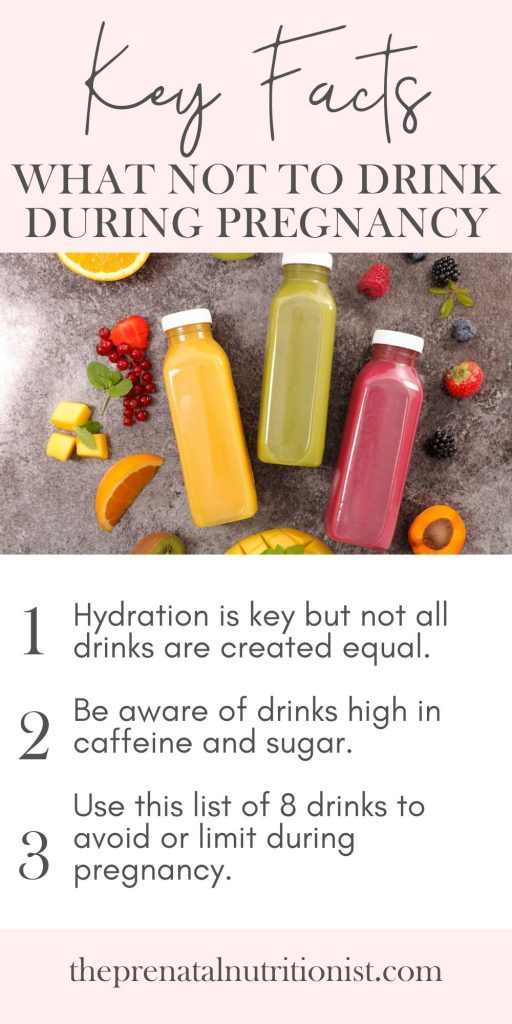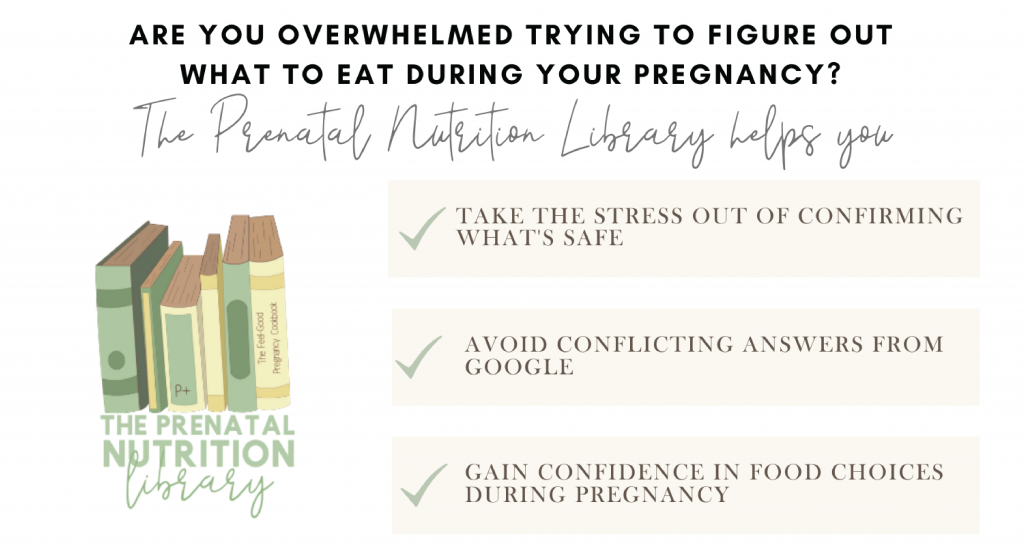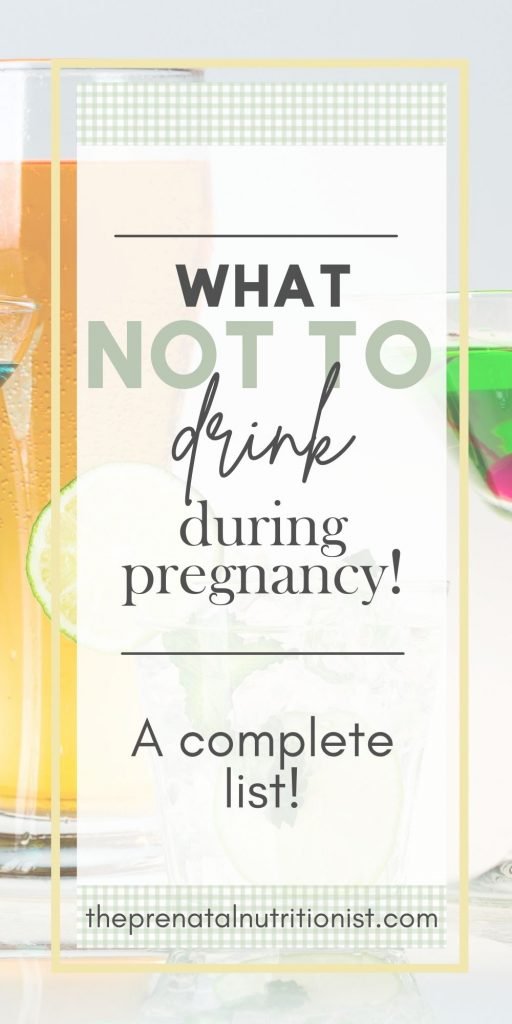
Hydration is key, especially for expectant moms and their unborn baby! Not only do pregnant women need it to support their growing baby, but it also has many added benefits during pregnancy. Pregnant people should drink around 10 8-ounce glasses of water per day. This is more than the generally recommended amount of 8 per day for the average population.
But, let’s face it, drinking plain water as your only source of hydration can get boring after some time. You might even feel the need to grab a soda or a warm cup of coffee to change it up and give your taste buds some flavor. However, those choices are not always the best during pregnancy. Especially because caffeinated beverages and overly sugary drinks are discouraged and not recommended as nutritious means to support pregnancy.
I know, it’s no fun to cut off your favorite drink from your diet but it’s not long term. Still, it’s all for the health of your baby! There are certain drinks that can put your future child in harm’s way and therefore are not safe to consume while expecting. And don’t sweat it if you’re unsure of which beverages are the ones you should steer clear of. Pregnancy can lead to healthy choices and I’m here to guide you through it!
Keep reading to find out what NOT to drink while pregnant!
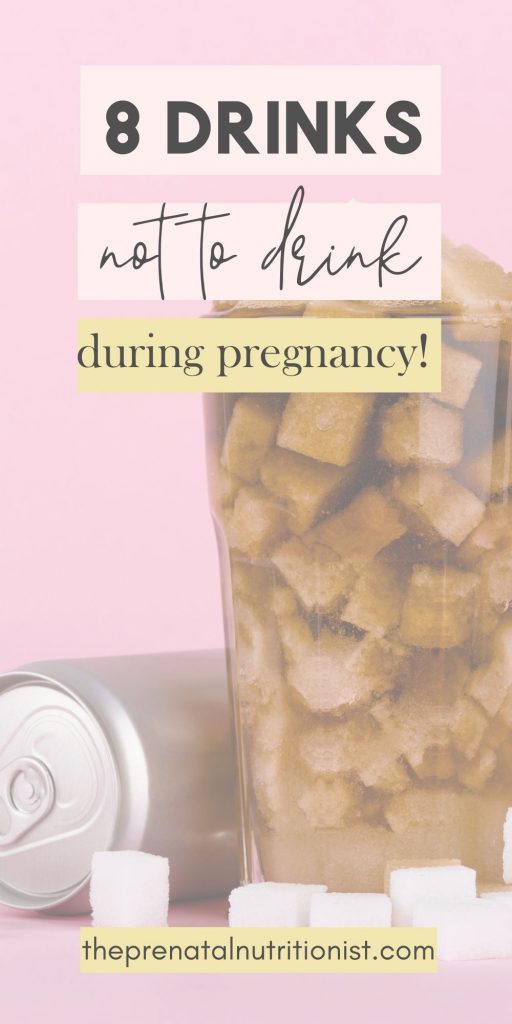
What Not To Drink While Pregnant
Alcohol
Alcohol is the one thing pretty much everyone knows they need to avoid while pregnant. No amount of alcohol is considered safe for pregnancy. It doesn’t matter if it’s “just a glass” or it’s a drink with a lower alcohol percentage. Drinking the smallest amount of alcohol poses its risks. Alcohol is one substance we know for a fact causes negative pregnancy outcomes. In fact, studies show drinking alcohol while expecting can lead to spontaneous abortion, severe birth defects, and cause premature birth. It’s best to refrain from alcohol entirely during pregnancy.
Unpasteurized Juices
Pasteurization is the process that kills bacteria or microbes to decrease the chances of foodborne illness. Almost all juices sold at the grocery store are pasteurized, by law, but some restaurants, juice shops, or coffee shops may serve unpasteurized fresh juice which may contain harmful bacteria. It is best to limit or avoid these options because of the increased risk.
If you like to juice at home, this is a bit less risky since you are in control of the process. Ensure you wash your produce thoroughly. If you want to be extra safe, you could boil the juice quickly on the stovetop before consuming it. This is essentially pasteurization. The FDA (US Food and Drug Administration) advises against any type of unpasteurized products for pregnant women. However, in general, our best bet is to limit the consumption of juice and go for the whole fruit which contains beneficial fiber!
Sugary Beverages
Added sugars and pregnancy are not a great match. It’s known that high blood sugar can cause health issues all around the human body. But the risks grow bigger while expecting! A study published by the American Journal of Preventive Medicine linked the consumption of sweetened beverages during pregnancy with reduced cognitive skills in children. It’s worth mentioning that the study didn’t ban all sugar for pregnant women, but rather advised against sugary drinks as the sugar in these drinks can really add up quickly even in some fruit juices and especially soft drinks. Next time you go for a drink other than plain water, check the ‘added sugar’ portion of the label to make sure it has little to none.
Raw Milk
Remember what I said about unpasteurized juices? Well, the same criteria apply to raw milk and other dairy products! Any unpasteurized beverage is a risk, but milk may be an even higher risk unpasteurized product, especially if buying from a grocery store. According to the FDA, raw milk or unpasteurized milk can carry Salmonella, E. coli, Listeria, Campylobacter, and other bacteria related to food poisoning and various serious side effects. To protect your growing baby, shop for milk that reads “pasteurized” on the label which is the large majority of milk! In many states in the US, it is illegal to sell raw milk at grocery stores and should be avoided during pregnancy. That may make you wonder about unpasteurized and soft cheese such as goat cheese, or how to cook eggs during pregnancy… we have plenty of information on other dairy in The Prenatal Nutrition Library!
Excessive Amounts of Coffee
Are you craving a steaming hot coffee? Coffee, tea, soda, and chocolate are all extremely popular worldwide, some more popular in certain countries which is why we DO have thousands of studies on caffeine use during pregnancy. High amounts of caffeine during pregnancy increase the risk of adverse pregnancy outcomes such as miscarriage, low birth weight, small for gestational age, and stillbirth, but the exact amount is unclear.
Tea Concentrate
Tea concentrate is essentially very, very strong tea that is often used to make large batches of iced tea. So, if it is used in a diluted fashion, it is likely okay, but it is not recommended to consume by itself due to the increased amount of caffeine. One cup of black, green, oolong or white tea per day is okay, but you still don’t want to overdo it. Many herbal teas (no caffeine) are safe to consume during pregnancy as well such as chamomile tea, ginger tea, peppermint tea, and lemon balm tea. Whenever you can, buy organic as well!
Energy Drinks
Most energy drinks contain significant amounts of caffeine and added sugar, two ingredients you want to limit while pregnant! As mentioned, it’s best to limit caffeine as much as possible, but we know that may be hard especially if it’s been part of your routine for a long time. If you had to choose, a small cup of coffee is much better than an energy drink, and here’s why. March of Dimes points out that a 24-ounce energy drink can have up to 500 milligrams of caffeine. This is much more caffeine than an average cup of joe or tea. These drinks may even cause unpleasant symptoms during your pregnancy like anxiety, heartburn, increased blood pressure, and increased heart rate.
Diet Soda
Diet soda might be a staple for a lot of women, but pregnancy is probably not the best time to consume this drink in excess. Believe it or not, diet soda contains a good amount of caffeine! It actually has about 42 mg per 12 ounces which is definitely under the limit if you aren’t consuming any other products high in caffeine. Diet soda is also sweetened with artificial sweeteners, like saccharin, which is ultimately not baby-building ingredients. For these two reasons, diet soda shouldn’t be your go-to drink when you want to quench your thirst. Aim for a low-sugar sports drink with electrolytes instead!
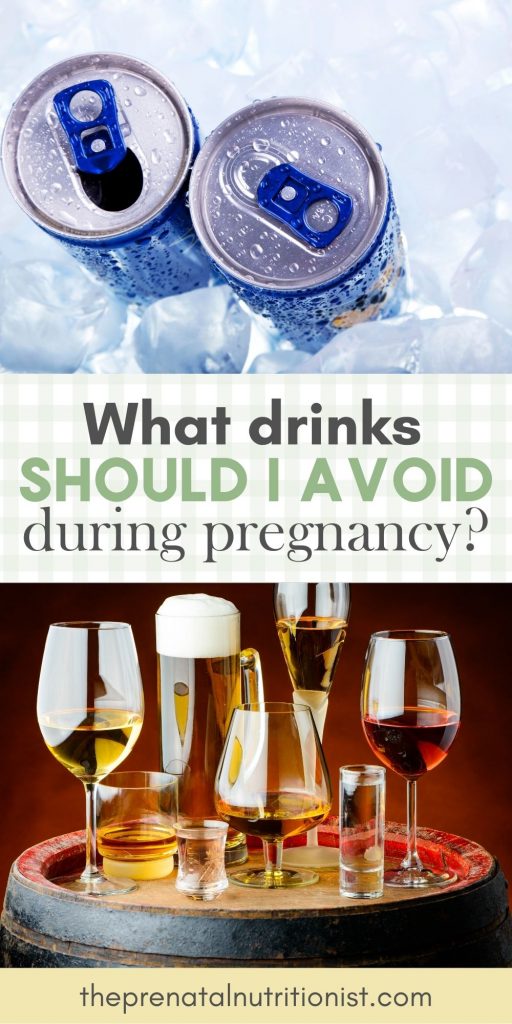
What are your favorite alternative beverages to drink during pregnancy?
So, there you have it! These 8 drinks should either be avoided (alcohol) or limited during pregnancy. I know it can feel like a challenge to give up a couple of these. But you can always look for replacement drinks to keep yourself hydrated whenever good old water gets a bit too repetitive!
Here are the 10 best drinks for early pregnancy so you can have something to sip on while going through your day. You’ll see there are more than enough safe-to-drink options for expectant moms! Although, remember to always check with your doctor before making any changes to your pregnancy diet, just in case.
That’s all for now! If you have any other questions, like “are hot dogs safe?” …be sure to head over to The Prenatal Nutrition Library, an online searchable hub of all things prenatal nutrition, for more evidence-based nutrition recommendations from a prenatal registered dietitian!
